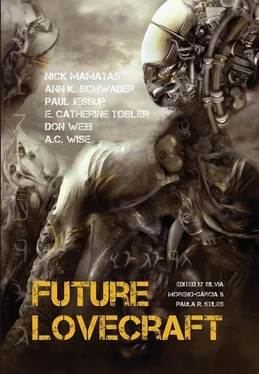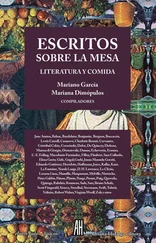And the other, when Gyorgi was better, was to insist that they get married.
✻ ✻ ✻
She lay on her couch, remembering now, while, on the moon’s far side, Gyorgi was sleeping. She had read the Western myths. Fantasy. Science fiction. Books she had purchased to read, alone, in the Florida nights while Gyorgi had been away on training.
She knew about training, and nights spent alone, even after her and Gyorgi’s marriage. Even though, by then, she was a cosmonaut, too, “to follow in the footsteps of Tereshkova,” as her husband had put it to those in command, there still was no question of her being actually sent into space, herself. Even Valentina Tereshkova had been a symbol, making that one flight in 1963, but, as a woman, thereafter perpetually grounded—so, too, her own job had continued to be primarily that of a mechanic.
But then the Soviet Union collapsed and they’d moved again, first to Luga, where her family came from—here, she could find work, whereas he was idle—and then to America, as a package with the great Energia rockets that NASA had bought from the Russian Republic, to help in the rebirth of its Moon program.
And while Gyorgi learned the ins and outs of American space capsules, Tasha had read Western authors and wondered. She’d wondered at all the authors’ obsessions with reaching the Moon. For all, it seemed the ultimate mystery, especially its dark side. And even, for some, it seemed also the key to a deeper mystery.
The Russian myths, before the Sun and Moon, spoke of gods of light and shadow. Of Byelobog and Chernobog. She wondered if Lovecraft had known the Russian myths—
Why had she thought of H.P. Lovecraft? Rather than Verne or Poe or the others?—yet, surely he had known, if not directly, as surely they all had. His vision sharper, perhaps, in some respects, just as the others’ was sharper in others. It was her belief that all human thought was ultimately based on identical truth, on some all-but-forgotten memory of Mankind.
Yet, the myths were, at base, simply metaphor. The evil of shadow was surely Man’s evil. That she believed, too. Just as the Energia rocket was her metaphor-child—she and Gyorgi had proved unable to have their own children, despite the myth-union of Dazhbog and Myesyats spawning the stars. But she’d helped assemble the Energia on its new American launchpad, so Gyorgi could ride it, and then, when Captain Brechner came down with the flu and she was assigned to the C.M. in his place, they both could ride it….
The ship to the Moon’s far side— through its darkness. Opening mysteries to reach to the stars beyond, past the planets, stars shrouded, yet burning bright in their own darkness. The children of Sun and Moon.
God and Goddess, one in the other.
✻ ✻ ✻
Tasha dreamed of the moon and stars, her mind metaphorically one with Gyorgi’s. It was while she slept in that way that she often felt she understood the most.
Tasha dreamed of the following morning—no need for TV, now—as the L.M. opened and three men dismounted, bulky in spacesuits. She walked with the first of them into the shadows.
She saw the balloon first, the one Poe had dreamed of in his chronicle of the Hollander-Cosmonaut, Hans Pfaall. She saw its bent hoop, its tangled netting, its bag-covered gondola—more than even her husband could see because her eyes were clearer. She saw the projectile that Jules Verne envisioned, fired from the giant columbiad cannon, which, even if it had not achieved touchdown, still lay on its side in the shadow before her.
She saw other shapes, too, arrayed in long rows. Rows that converged on the central mountain. A bicycle-like frame, surrounded by skeletons of long-dead geese; another, surrounded by metal spheres. The V2-like slimness of Robert Heinlein’s and Willy Ley’s coupled dream, made into cinematic flesh in a film she’d seen once when she was a child, Destination Moon . And yet other shapes, too, saucer-like nightmares, the visions of men like Jessup and Scully that lay, side by side, with truly non -human dreams. Shapes to fit truly non-human proportions….
She blinked.
…and yet, all dead. The ships crushed and broken….
She heard Gyorgi thinking:
…Let us put bones, then. This plain would be nothing but an immense cemetery, on which would repose the mortal remains of thousands of extinct generations….
She woke. Yes, a graveyard. A graveyard of spaceships. The words were not Gyorgi’s, though, but—she thought back—those of Michel Arden. The French adventurer in Jules Verne’s novel.
She blinked. On Earth, in Houston, the Sun would have just gone down—she’d slept the whole day through. Far to the west, the Moon would be setting, too; this time, she wouldn’t see even a sliver.
The TV monitor was still on, the equipment functioning automatically. She heard its static. She sat up to look at it, seeing the images, shadowy, fleck-filled.
“…Tomorrow, we’ll rig lights that we can take with us,” her husband was saying. NASA was gentle, unlike the Cosmonaut Corps of her own nation—first, they must have rest. “Those, with the portable camera we have now, may give more information on those oddly shaped rocks we’ve found.” Then, he had not seen.
She sank back to the couch as he gave his description. A cemetery, yes, laid in rows, but still only stone and dust.
Only she saw what was buried beneath it.
✻ ✻ ✻
Gyorgi! she screamed—knowing he couldn’t hear her, not outside—watching her husband step from the L.M. the final time. Half-dreaming, half waking-in front of the monitor, she waited as the three astronauts, in blazing light now, walked through the ships’ graveyard, her own spacecraft having swung back around the Moon too late to do anything more than just watch them. She saw, with her vision, the L.M. itself, in the line of corpses. The crushing of Men’s dreams.
But Gyorgi could not see.
During the night, she’d recalled, in her mind’s eye, those last days before the launch. Her husband’s arguments with NASA that not only had she had cosmonaut experience—something of an exaggeration, at best—but also that, as a woman, with a woman’s patience and natural steadiness, her presence in orbit around the Moon would impart a steadfastness in those that were on its surface. But he had been wrong. She did not have patience. Not for the sort of waiting she did now, wanting to see, straining to see, what, even with the aid of their cameras, her husband could at best describe only dimly.
Except….
Except that she did see. The loneliness and stress produced visions in her mind. She’d looked to her instruments first, of course, the “Christmas tree” panel lights all still glowing green, just in case it might be some bad mix of air. She’d checked and re-checked again, thinking at one point she might call NASA to ask their opinion, but, no, she had best not—why cause needless worries? It was only the loneliness, after all, that and the fitfulness of her sleep habits, despite the schedule of sleep-times NASA had asked her to follow.
But how could she have slept otherwise, now that Gyorgi and the others were on the Moon’s surface?
And so, the visions came, these from the books she had hoarded that autumn. The dreams of a Heinlein, naive and hope-filled, mixed with the more cautious, Gallic optimism of Verne. And the darker, although still ambiguous, visions of Wells and Poe—Poe, with his bleakness, his soul-searing horror, still having his astronaut dream, too, of fields of Selenite poppies. Of lakes and forests.
Читать дальше












